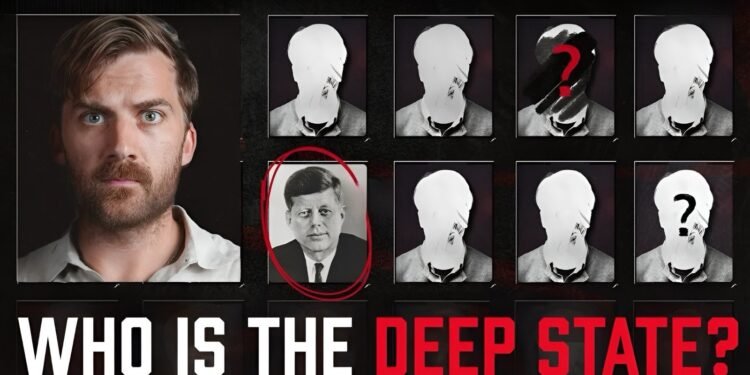Is the Deep State Real? Analyzing Claims and Historical Context
In a recent video, Johnny Harris explores the concept of the “deep state” and its implications for American democracy. As Jason Imarka, I will provide a detailed analysis, fact-checking the claims made and offering additional context to understand the roots and reality of the deep state.
The Deep State: A Historical Perspective
The Origins of the Concept
The term “deep state” has been popularized in recent years, often used to describe a supposed secretive and influential group within the government that operates independently of elected officials. This notion, however, is not entirely new. The historical roots of the deep state can be traced back to the early Cold War era and the establishment of powerful intelligence agencies.
The Cuban Missile Crisis
The video begins by referencing the Cuban Missile Crisis of the 1960s, a pivotal moment in history where the United States discovered Soviet nuclear missiles in Cuba. President Kennedy’s decision-making process during this crisis highlighted the influence of unelected officials and intelligence agencies. Instead of solely relying on his formal advisors, Kennedy consulted with powerful figures in Georgetown, Washington D.C., including CIA officials and influential columnists.
This incident underscores how critical decisions were often influenced by a network of powerful individuals who were not accountable to the public. This network included figures like William Colby, Allen Dulles, and Frank Wisner, who played significant roles in shaping U.S. foreign policy during the Cold War.
The Birth and Rise of the CIA
The OSS and World War II
The precursor to the CIA was the Office of Strategic Services (OSS), established during World War II. Led by Wild Bill Donovan, the OSS was tasked with gathering intelligence and conducting covert operations. The success of the OSS during the war laid the groundwork for a permanent intelligence agency.
The Establishment of the CIA
In 1947, President Truman signed the National Security Act, which created the CIA. Truman was initially cautious about the agency’s potential for unchecked power, fearing it could become an “American Gestapo.” Despite these concerns, the Cold War necessitated a robust intelligence apparatus to counter the Soviet threat.
The CIA quickly became a formidable force, engaging in numerous covert operations around the world. These included coups in Iran (1953) and Guatemala (1954), as well as attempts to influence elections and support friendly regimes. These actions were often carried out without public knowledge or oversight, leading to concerns about the agency’s accountability.
Unpacking the Cuban Missile Crisis: A Case Study
The Cuban Missile Crisis offers a revealing glimpse into the potential existence and influence of the deep state. During this high-stakes confrontation between the United States and the Soviet Union in the 1960s, President Kennedy’s actions highlighted the power dynamics in Washington, D.C. Despite the looming threat of nuclear war, Kennedy sought counsel not just from his official advisors but also from influential figures in Georgetown, such as former CIA directors and high-ranking officials who lived nearby. This episode underscores the presence of unelected individuals wielding significant power behind the scenes, a hallmark of what many consider the deep state.
The OSS and CIA: Seeds of the Deep State
The origins of the modern deep state can be traced back to World War II with the establishment of the Office of Strategic Services (OSS). Led by Wild Bill Donovan, the OSS engaged in covert operations, espionage, and psychological warfare. Although the OSS was disbanded after the war, the Cold War soon necessitated the creation of a permanent intelligence agency—the CIA. This agency inherited the OSS’s clandestine activities and expanded them globally. From orchestrating coups in Iran and Guatemala to conducting mind control experiments under MKUltra, the CIA operated with minimal oversight, setting the stage for a powerful, secretive government faction.
The Church Committee Hearings: Shedding Light on Dark Secrets
In the 1970s, the Church Committee Hearings exposed the extent of the CIA and FBI’s clandestine operations. These hearings revealed shocking details about illegal surveillance, assassination plots, and domestic spying. The revelations led to the establishment of oversight mechanisms aimed at curbing the power of intelligence agencies. However, the hearings also highlighted the entrenched nature of these agencies and their ability to operate beyond the reach of democratic accountability, fueling suspicions about the deep state’s ongoing influence.
Post-9/11: The Deep State Resurfaces
The aftermath of the September 11 attacks saw a resurgence of the deep state’s power. The passage of the Patriot Act and the creation of the Department of Homeland Security expanded the surveillance capabilities of intelligence agencies. Whistleblowers like Edward Snowden later revealed the extent of mass surveillance programs, raising concerns about the erosion of civil liberties and the unchecked power of government agencies. This period solidified the deep state’s role in national security, operating under the guise of protecting the nation while often circumventing constitutional safeguards.
Conspiracy or Reality? The Deep State Today
While some dismiss the deep state as a conspiracy theory, historical events and documented cases provide substantial evidence of its existence. The interplay between elected officials and powerful unelected bureaucrats continues to shape U.S. policies and actions. Understanding this dynamic is crucial for maintaining transparency and accountability in government. As the debate over the deep state’s influence persists, it remains essential to scrutinize the balance of power within our democratic institutions.
The Power of Unelected Officials
The Georgetown Set
The video highlights the influence of the “Georgetown Set,” a group of powerful individuals living in Georgetown who wielded significant influence over U.S. policy. This group included high-ranking CIA officials, journalists, and other key figures who met regularly to discuss and shape policy.
This informal network operated outside the bounds of democratic accountability, raising concerns about the concentration of power in the hands of a few unelected individuals. Their decisions had far-reaching consequences, often shaping the course of U.S. foreign policy without public scrutiny.
The Church Committee and Oversight
By the 1970s, the CIA’s extensive covert activities and abuses of power had become increasingly apparent. The Church Committee, led by Senator Frank Church, conducted extensive investigations into the agency’s actions. The committee revealed numerous illegal and unethical activities, including domestic spying, assassination plots, and mind control experiments under MKUltra.
The Church Committee’s findings led to significant reforms, including the establishment of permanent oversight committees in Congress. These reforms aimed to increase transparency and accountability within the intelligence community.
The Post-9/11 Era and the Expansion of the Deep State
The Patriot Act and New Agencies
The attacks on September 11, 2001, marked a turning point in U.S. national security policy. The government responded by passing the Patriot Act, which expanded the powers of intelligence agencies to conduct surveillance and gather information. New agencies, such as the Department of Homeland Security, were created to address the growing security threats.
Edward Snowden and NSA Surveillance
The expansion of surveillance capabilities in the post-9/11 era raised significant privacy concerns. Whistleblower Edward Snowden’s revelations about the National Security Agency’s (NSA) extensive surveillance programs brought these issues to the forefront. Snowden’s disclosures highlighted the vast reach of government surveillance and the lack of transparency and accountability.
Conclusion: Balancing Security and Democracy
The concept of the deep state is rooted in the historical evolution of intelligence agencies and the concentration of power among unelected officials. While these agencies play a critical role in national security, their actions must be balanced with democratic accountability and transparency.
Thought-Provoking Questions
- How can we ensure that intelligence agencies operate within the bounds of democratic accountability?
- What measures can be taken to prevent the abuse of power by unelected officials?
- How should the balance between national security and individual privacy be managed in the digital age?
- What lessons can be learned from the Church Committee’s findings to improve oversight of intelligence agencies?
- How can public trust in government institutions be restored in light of past abuses of power?



